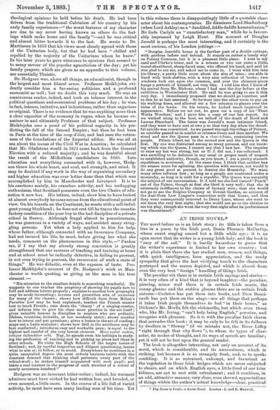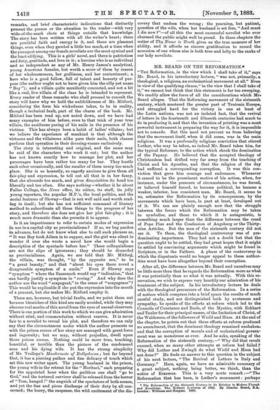AN IRISH NOVEL*
TILE novel before us is an Irish story ; its title is taken from a line in a poem by the Irish poet, Denis Florence McCarthy,
whose sweet singing ceased but a little while ago ; it is an open secret that its writer is a young Irish lady, and the book is "racy of the soil." It is hardly hazardous to guess that the writer's experience is limited to her own country ; but it is plain that there she has studied men, women, and things,, With quick intelligence, keen appreciation, and the ready sympathy that gives the last vivifying touch to the characters portrayed and the scenes depicted, and which is absent from even the very best " foreign " handling of things Irish.
The peculiar wit there is in certain Irish sayings and stories— it is very often of a kind that is beyond laughter—the peculiar, piercing, minor wail there is in certain Irish music, the sunny gleams and the sudden glooms there are in certain Irish natures—Carleton has put them into books, and Dion Bouci- canit has put them on the stage—are all things that perhaps it takes Irish people themselves to feel "in their bones," as Dickens's Mr. Morfin felt the violoncello, but which even those who, like Mr. Irving, " can't help being English," perceive, and recognise with pleasure. So it is with the peculiar Irish charm that pervades this book ; it may be only to be felt in its fullness by dwellers in " Sloway " (if we mistake not, the River Liffey "right through that city flows "), to whom its types of char- acter, its modes of thought, and its ways of speech are familiar; yet it will not be lost upon the general reader.
The book is altogether interesting, not only on account of its merit, which is considerable, and its unusualness, which is striking, but because it is so strangely fresh, and, so to speak, confiding. It is as untrained, unkempt, and luxuriant as the vegetation in those Irish hedges which are never subjected to shears, and on which English eyes, a little tired of our trim tidiness, are apt to rest with refreshment ; and it combines, in an odd, attractive manner, very close, even shrewd, appreciations of things within the author's actual knowledge—clear, practical
• Thy Name is Truth; a Social Novel. London : J. and It. liazwolL remarks, and brief characteristic indications that distinctly present the person or the situation to the reader—with very wide-of-the-mark shots at things outside that knowledge. The story has been written with all the writer's heart; there are youthful faith and energy in it, and these are pleasant things, even when they gambol a little too much, at a time when the youngest among our female novelists are the most cynical and the least edifying. This is a girls' novel, and there is patriotism and duty, gratitude, and love in it ; a heroine who is as individual and as independent as any of Mr. Henry James's analytical, young American females, but worth a score of them by reason of her wholesomeness, her godliness, and her contentment; a hero who is a good fellow, full of talent and honesty of pur- pose (the author ought not to have given him the silly pet name
Boy "); and a villain quite manifestly concocted, and not a bit like a real, live villain of the class he is intended to represent. Every reader of these remarks who shall proceed to consult the story will know why we hold the nnlifelikeness of Mr. Mitford, considering the form his wickedness takes, to be in reality, though a technical fault, part of the charm of the book. Mr. Mitford has been read up, not noted down, and we have had many examples of him before, even to that trick of your true villain, the assiduous paring of his nails in the presence of his victims. This has always been a habit of ladies' villains; but we believe the experience of mankind is that although the virtuous and the villainous alike pare their nails, both classes perform that operation in their dressing-rooms exclusively.
The story is interesting and original, and the same may be said of the characters who work it out; but the author has not known exactly how to manage her plot, and her personages have been rather too many for her. They hustle each other occasionally, and the smaller of them usurp too much place. She is so honestly, so eagerly anxious to give them all fair-play and expression, to tell out all that is in her fancy, that she abounds too much, and gives disquisition its head too liberally and too often. She says nothing—whether it be about Pallas College, the News office, its editor, its staff, its jolly young reporters, the popular M.P.'s, the local politics, and the social features of Sloway—that is not well said and worth read- ing in itself; but she has not sufficient command. of literary method to subordinate all these things to the progress of her story, and therefore she does not give her plot fair-play ; it is much more dramatic than she permits it to appear.
Is it an impertinence to refer to certain modes of expression in use in a capital city as provincialisms ? If so, we beg pardon in advance, but do not know what else to call such phrases as, "It was Boy took Aileen in to supper, and the girl was silent in wonder if ever -she wrote a novel how she would begin a description of the spectacle before her." These colloquialisms are not the slips of ignorance ; they should be discarded as provincialisms. Again, we are told that Mr. Mitforcl, the villain, was thought, " by the opposite sex," to be ." a great beauty," and that " about his eyes there roved. a disagreeable symptom of a smile." Even if Sloway says "symptom " where the Sassenach would say "indication," that can hardly justify a symptom in "roving." And why does the author use the word " scapegoat," in the sense of "scapegrace"? This would be explicable if she put the expression into the mouth of a peasant, but she makes Mr. Mitford employ it.
These are, however, but trivial faults, and we point them out because blemishes of this kind are easily avoided, while they may obscure real merits of this novel from the eyes of casual observers. There is one portion of this work to which we can give admiration without stint, and commendation without reserve. It is never fair to a novelist to reveal his plot, and therefore we can only say that the circumstances under which the author presents us with the prison scenes of her story are managed with great force and ingenuity; but we may, without prejudice, dwell upon those prison scenes. Nothing could be more true, touching, beautiful, or terrible than the picture of the condemned man and his dying wife. It has the strong simplicity of Mr. Trollope's Afacdermots of Ballydoran ; but far beyond that, it has a piercing pathos and fine delicacy of touch which set this new writer apart. The young husband in the prison, the young wife in the retreat for the " Morituri," each preparing for the appointed hour when the guiltless one shall "go to God," and the tortured survivor shall be released from the horror of " Tom, hanged I" the anguish of the spectators of both scenes, and yet the fine and pious discharge of their duty by all con- cerned; the hurry, the suspense, the wild excitement of the dis- covery that undoes the wrong ; the yearning, but patient, question of the wife, when her husband is set free, "And must I die now ?"—of all this the most successful novelist who ever charmed the public might well be proud. In these chapters the writer of Thy Name is Truth gives us the true measure of her ability, and it affords ns sincere gratification. to record* the accession of one whose aim is both true and lofty to the ranks of our lady novelists.







































 Previous page
Previous page